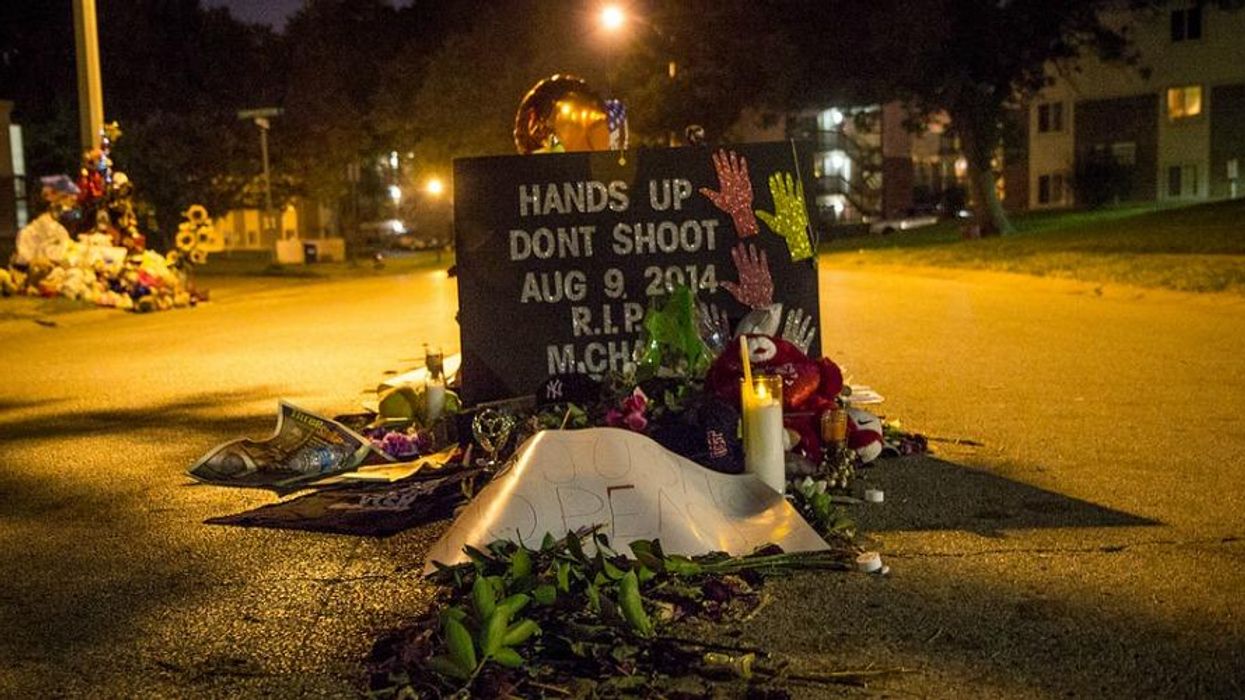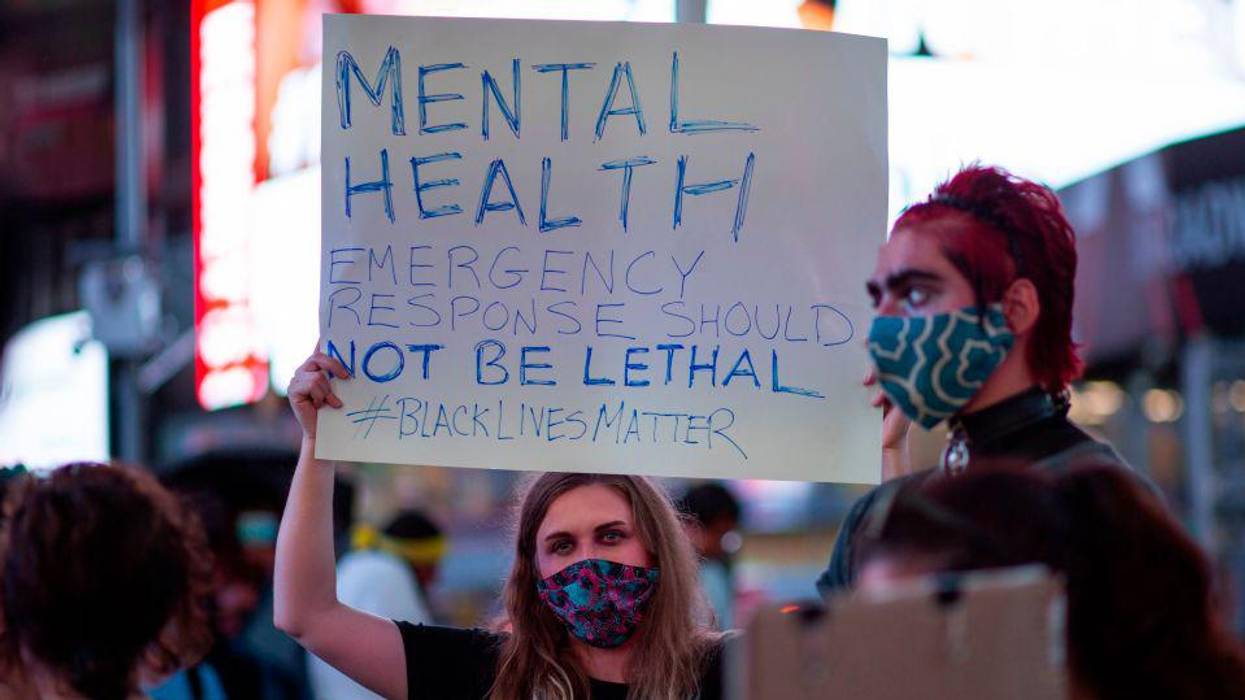Remembering Mike Brown: Recommitting to the Fight for Power
As the nation reflects on how Ferguson changed the world, I’m asking that you think about what we have to do in the next 10 years to ensure that we’re moving closer to a world where uprisings like that one aren’t necessary.
On August 9, 2014, I was at the United Nations, attending the Convention on Eliminating Racial Discrimination, or UN CERD, as part of a delegation of Black organizers and activists who were testifying to the conditions of Black people in the United States organized by the U.S. Human Rights Network. I cried for the greater part of that day, sitting with the weight of the injustices and murders of Black people.
There was a chill in the air and not a dry eye in the room at the UN CERD as Trayvon Martin’s mom, Sybrina Fulton, testified about the murder of her son. I remember the testimony of Jordan Davis’ father, Ron Davis, about the murder of his son and the silence that fell as he broke into tears. Both of their sons were murdered by state-sanctioned violence—by the state emboldening police, or even neighborhood watch volunteers, to take Black lives with impunity. I can still hear the testimonies of Black feminist organizations like Black Women’s Blueprint and activists from Chicago who spoke about police violence and murders of Black women and men. I spoke and testified about housing insecurities and violence against LGBTQI+ people. For us, all of those stories were connected and shared—they were all about Black lives not being valued and Black folks needing to build people power in order to stop it.
While at U.N. CERD, an African diplomat asked, “What is happening in Ferguson?” This was the first time I had heard of Ferguson, Missouri. I quickly researched all I could about Ferguson and what was happening. As a parent, I immediately felt another profound loss of another child, Mike. The murder of Mike Brown Jr. felt as intimate, as close, and as violating as that of Trayvon Martin, Jordan Davis, Aiyanna Jones, and the many others taken by state-sanctioned violence before August 9.
Our work continues as we navigate the rapidly growing rise and threat of fascism, a complex electoral landscape, an ever-worsening climate crisis, and the continued murder of Black people by the police, such as the killing of Sonya Massey
It was all overwhelming. It was clear that, as a people, we had lost too much. In our time of deepest need, the state responded by further declaring war against its people with tanks, tear gas, and militarized occupation. We were outraged. We knew that we had to take action; we didn’t know what to do, but we knew we needed to be there with those brave freedom fighters in Ferguson. A few comrades and I left the U.N. CERD meeting and headed straight to Ferguson.
Upon arriving in Ferguson, we learned about Mike through the memories his people shared of him. He was beloved by the community, and more than that, he represented so many of us, and we all shared so many similarities with him—Mike’s life was not abstract; it was real, tangible, and familiar. Mike Brown Jr. looked like many in our families and neighborhoods. Mike Brown Jr. looked like my nephew and other young men in my own life. It is a psychological terror when faces and bodies so much like your own are hunted down and killed. We still grieve and mourn Mike, and his memory continues to fuel our fight for power and liberation.
As revolutionaries, our role is not only to grieve and mourn but to honor our people—present, past, and those who will come after us—by acting to create the society we deserve. For months, Mike Brown Jr. was honored through the sustained action and rebellion in the streets of Ferguson and actions around the globe. Uttering his name invited millions to say the names of Black people killed by police, and that reverberation ignited a new conversation about racialized violence. Each day, each hour, there was resistance against police murders and state-sanctioned violence and an assertion that Black people deserve to live without the fear and threat of police terror. The days were consumed with marches, rallies, escalations, and time in community, and the nights were long and filled with strategy meetings, event prep, and far less rest than our bodies needed. But even when those protests ended, the work did not. Mike Brown Jr. and the Ferguson Uprisings woke something up in us, inspiring a new era of the Black liberation movement that has sustained for a decade and counting. Our lives, my life, changed forever.
At the Movement 4 Black Lives (M4BL), we are fighting for a fundamentally different world, one where he and all of us would be safe, protected, and given the best conditions to thrive and determine our own outcomes.
Since the Ferguson Rebellion, M4BL has remained committed to advancing abolition, anti-capitalism, and Black Queer Feminism. We organize and advance our vision in local communities and nationally. Our strategies range from advancing policy and electoral shifts to building our own institutions and alternatives to oppressive systems. We are proud of the organizing of our member organizations in Ferguson and St. Louis, who have been vital in the resistance and power building, such as Action St. Louis and the Organization for Black Struggle.
In our 10 years of building social movement power within Black communities, we are proud of our interventions to create policy and legislative change through the Vision 4 Black Lives, Breathe Act, and People’s Response Act that all emphasize divesting from the carceral state and instead investing in alternatives that support and nourish Black lives and communities. We are excited to report about the dozens of campaigns that have won and advanced local wins, ranging from removing police officers from schools to creating housing, changing educational policies, creating safety pods and alternatives to policing, advancing reproductive justice, and engaging communities in environmental and climate change preparedness.
Our work continues as we navigate the rapidly growing rise and threat of fascism, a complex electoral landscape, an ever-worsening climate crisis, and the continued murder of Black people by the police, such as the killing of Sonya Massey. We are clear about our need to build more power to position ourselves to create the world we need and deserve. Now and forever, we honor Mike Brown Jr. in our organizing work and all those who have been taken from us. Today, as the nation reflects on how Ferguson changed the world, I’m asking that you think about what we have to do in the next 10 years to ensure that we’re moving closer to a world where uprisings like the one that rattled the foundation of our nation aren’t necessary. We are still feeling the impact of what happened 10 years ago across all aspects of society: culturally, politically, socially, and economically. And we are less than 80 days away from a presidential election where the freedom to engage in our democracy is literally on the ballot.
We know that much of what is being promised in Project 2025 is a direct response to the transformational change that came out of the Ferguson Uprising. So, I’m asking that you keep that front of mind as you consider the change you want to see in the next four years. I’m asking that you don’t overlook the communities in Ferguson who never asked for their city to be thrust into the spotlight but acted quickly to demand change and accountability from their local police and from the system of policing at large. Please remember Mike’s family, loved ones, and the organizers on the ground who carry on liberatory work in ways that can only be described as revolutionary and rooted in a deep love for their people. Today, consider your personal responsibility in changing our world over the next 10 years.
We began seeding M4BL during the Uprising because we knew there were necessary things we could do together that we could not do apart. And we still believe that. Join us in building people's power to make liberation more than a freedom dream; let’s make it a reality.

